News & Media
Combating GBV requires a new paradigm of thinking
In celebration of Women’s Month, the South African Chapter of the International Association of Women Judges (SAC-IAWJ), in collaboration with Unisa and the Department of Women, Youth and People with Disabilities (DWYPD), hosted a gala dinner on 5 August 2022 as part of its 16th Conference and Annual General Meeting. The event, themed “Empowerment as a Tool to Fight Gender-Based Violence (GBV) #Breaking Barriers and Bias”, was attended by esteemed jurists including South African Chief Justice, Raymond Zondo, and prominent academics.
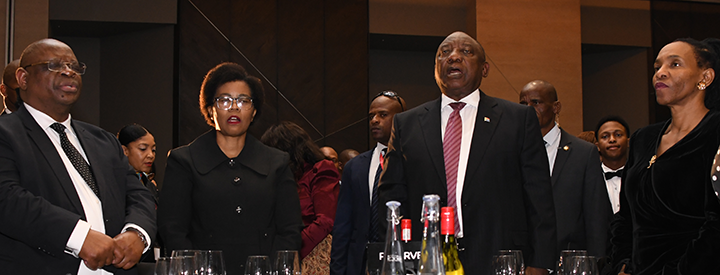
From left, Justice Raymond Zondo, Prof Puleng LenkaBula, His Excellency President Cyril Ramaphosa and Justice Mandisa Maya join attendees in singing the national anthem
South African President, His Excellency Cyril Ramaphosa, delivered the keynote address at the gala dinner. The SAC-IAWJ conferred its Women Pioneers in the Judiciary Award to the first woman jurist to be appointed as the Deputy Chief Justice of the Republic of South Africa, Justice Mandisa Maya. Among those who congratulated Maya on her appointment were prominent international jurists.
The award was conferred by Justice Baratang Mocumie, former SAC-IAWJ President and Supreme Court of Appeal Judge, and the Honourable Maite Nkoana-Mashabane, Minister of Women, Youth and Persons with Disabilities. South African praise poet and singer, Dr Bishop Jessica Mbangeni, delivered a moving poem in praise of Maya.
Elegantly directing the programme, Justice Thoba Poyo-Dlwati, Acting Deputy Judge President, KwaZulu-Natal Division of the High Court, and SAC-IAWJ Deputy President, said: “SAC-IAWJ pursues its objectives to contribute to the transformation of the judiciary and the justice system in South Africa in order to promote its legitimacy and to ensure gender equality.”
Tackling women’s rights and GBV
In her opening address, Maya said that the mission of the SAC-AIWJ is to promote and empower women judges in the judiciaries, who they feel are good at, among others, addressing discriminatory laws, and advancing the gender responsive cause and human rights for all. She remarked: “When tacking societal issues such as unemployment, cost of living, malnutrition, alcohol abuse and mental health, we need to be mindful that the protection and economic disadvantages of women require urgent attention.”
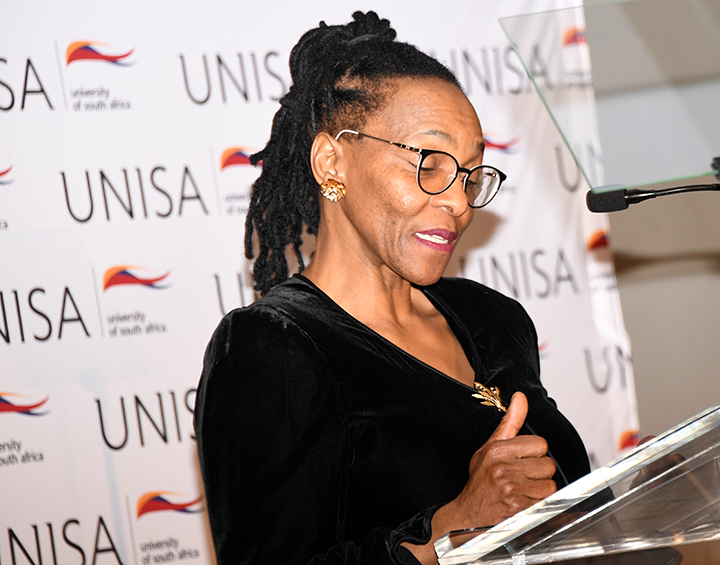
Justice Mandisa Maya delivering her address
Maya raised the concern that South Africa has some of the most sophisticated laws against discrimination and violence in the world, yet GBV continues to rise astronomically. “Also,” she said, “the DWYPD is grossly under-resourced, which affects the impact that it is supposed to make in the society.” Noting that not all GBV cases make it to the media, she continued: “The root of the GBV scourge must be dug out and destroyed. This requires us to move to a new paradigm of thinking and of doing things, and to reassess and refine our strategies with the involvement of the society.”
Universities responding to societal challenges
In her welcome address, Professor Puleng LenkaBula, Unisa’s Principal and Vice-Chancellor (VC), stated that Unisa is proud to host the conference and the gala dinner during Women’s Month. “The members of the SAC-IAWJ are a testament of the resilience and commitment of women to ensure that despite the real and imaginary impediments around women’s dignity, we constantly agitate for change.” She continued: “Unisa proudly provides an important resource of shaping futures.” LenkaBula encouraged universities to not just be ivory towers that provide knowledge, but to also respond to societal challenges.
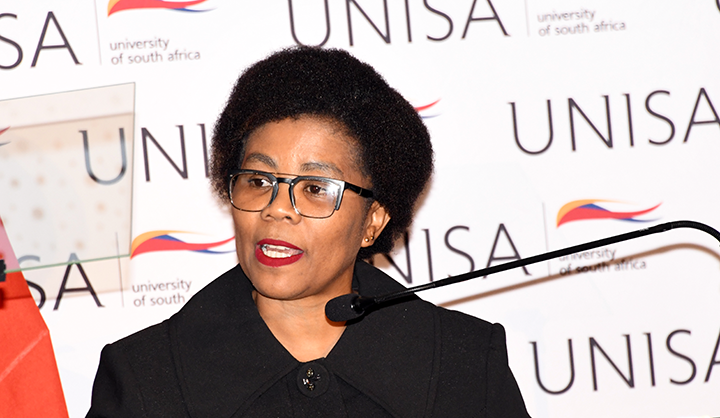
Prof Puleng LenkaBula during her welcome address
The VC remarked: “Our laws have been based on western traditions and civilisation for a long time.” She continued: “As universities, we are exploring how we can Africanise our knowledge systems and ensure that the best of Africa’s civilisation, legislative systems, philosophies and technologies become the rallying point in overcoming GBV, gender injustices, and inequality in our country and continent.”
The VC later facilitated a colloquy focusing on “The role of women as ethical leaders in society”. Advocate Mojanku Gumbi, Chancellor of the University of Venda, and politician Dr Gwen Ramokgopa, former Chancellor of the Tshwane University of Technology, spoke masterfully on the theme. Gumbi said: “We have not done enough to confront our societal challenges. Institutions of higher learning must respond to these challenges.” Ramokgopa encouraged South Africa to invest in education to eradicate some societal challenges. “Innovations and the use of knowledge must be able to advance us as a society,” she said.
Calling for a non-sexist society
Introducing South African President Cyril Ramaphosa as keynote speaker was the Honourable Ronald Lamola, Minister of Justice and Correctional Services. Lamola reiterated that the President is committed to transformation, including transformation of gender in the South African judiciary.
President Ramaphosa proudly mentioned that he is a Unisa alumnus. Focusing on Women’s Month, he said: “We remember the courage and resilience of women 66 years ago, who took on the might of the apartheid regime to demand an end to the degrading and dehumanising laws that were used against them.” The President reflected on the improved representation of women, particularly African in top judicial and government positions. He made a commitment to continue to properly empower women in the state system.
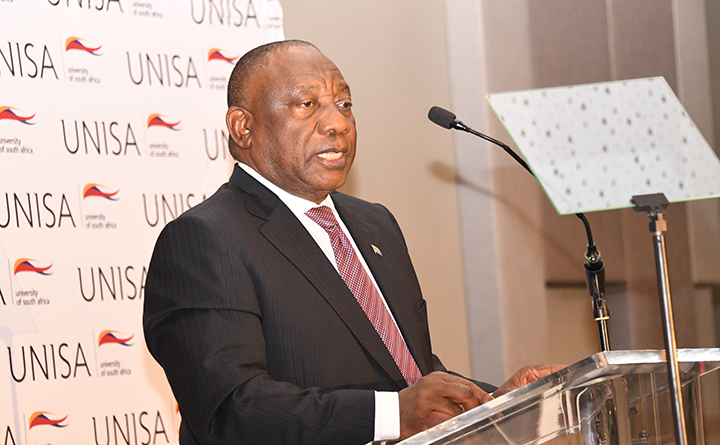
President Cyril Ramaphosa delivering the keynote address
Congratulating Maya, the President affirmed: “You are where you are because of your capability. You are an inspiration to women in the judiciary, and to the young and old generations.” Considering the challenges of, among others, biasness, discrimination, sexism, and racism that women jurists must overcome, he lauded them for their strength and ability to rise in these challenges. He said that the growing number of young women entering the legal profession is encouraging.
“The oppression of women is a global problem. GBV is a pandemic that must be discontinued as it is holding us back from advancing the rights of women.” He affirmed: “No society can claim to be non-sexist when their women live in fear.” The President concluded by calling on men, the state, and society at large to protect and respect women’s rights.
In closing, Unisa’s Professor Rehana Cassim of the College of Law lauded Maya for being a global icon and inspiration to South Africans, particularly women.
*By Nancy Legodi, Acting Journalist, Department of Institutional Advancement
Publish date: 2022-08-06 00:00:00.0

 Seven Unisans nominated for the NSTF-South32 Awards 2023/2024
Seven Unisans nominated for the NSTF-South32 Awards 2023/2024
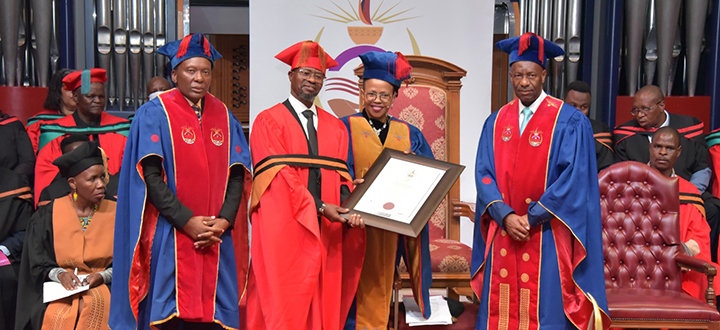 Unisa awards posthumous honorary doctorate to literary maven, OK Matsepe
Unisa awards posthumous honorary doctorate to literary maven, OK Matsepe
 From humble beginnings to academic leadership
From humble beginnings to academic leadership
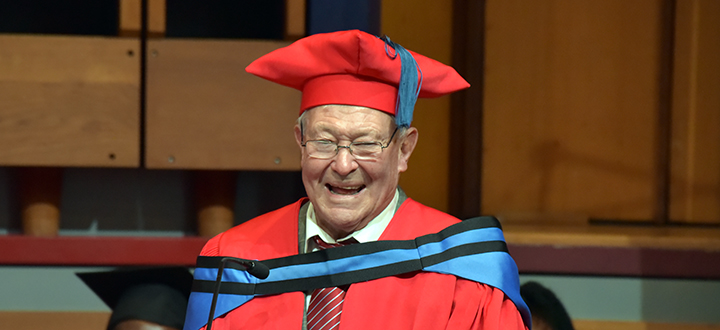 Community champion and agricultural entrepreneur extraordinaire honoured by Unisa
Community champion and agricultural entrepreneur extraordinaire honoured by Unisa
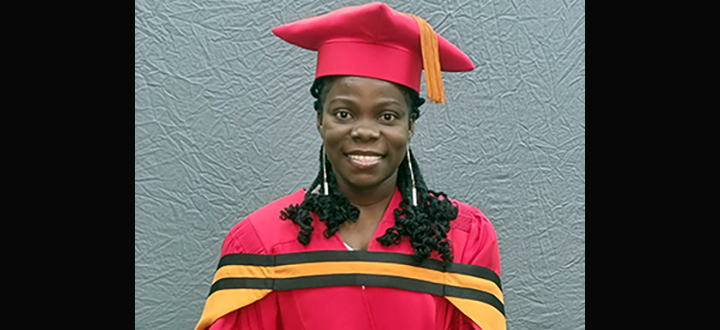 Ghanaian-born Swede earns PhD in Information Sciences from Unisa
Ghanaian-born Swede earns PhD in Information Sciences from Unisa